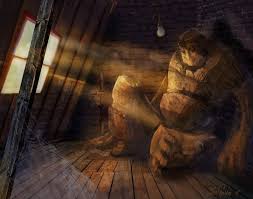
Divine Matrix
According to Braden, Divine Matrix is “the container that holds the universe, the bridge between all things, and the mirror that shows us what we have created” (p. 4). This definition comprises three components that frame Divine Matrix: container, bridge, and mirror. The current issue of Artifacts gives a good example of the Divine Matrix in education.

Care for Life? The Failing System of Nursing Home Care in the United States
The phrase “respect your elders” is ingrained in most minds at a young age. This phrase, however, has been lost somewhere. A lack of respect for the elderly is especially present in the quality of health care they receive. Not only are the elderly discriminated against in the US health care system, many of their health problems are cast off as “getting old.”

Elijah’s Inferno
Elijah Solidum is a junior student, majoring in International Business Management. His hometown is Nevada, MO, but he has lived in the Philippines, New York, and New Hampshire. He chose to write “Elijah's Inferno” because he had read Dante's Inferno in class that semester, and he wanted to put a personal and more modern spin on Dante's masterpiece.

How to Live a Life
Living life as a human, on planet Earth, is a phenomenon that anyone who is ever written a single word has perfect experience with. It would be impossible not to. For better or for worse, we all share the same fundamental experience. Separation in space or time can certainly alter how two people view the world. The overwhelming consensus, however, whether revealed through science, or the vast array of parallels in our art, religion, and literature, point to one fact. We are vastly more similar to one another than we are different. Of all these similarities, one would be hard pressed to find some more striking than the reoccurring stories we have told each other over the vast course of our history.

Oy Vey! The Jewish Golem and The X-Files
Golems are everywhere. In modern popular culture, the Jewish Golem — sorry, Gollum from “The Lord of the Rings” books and movies isn’t a golem— has appeared in many TV shows, films and books. Most recently, stone golems called “Watchers” help Noah’s family build their life vessel in this year’s film Noah. 2013 saw Sam and Dean Winchester battle a golem in an episode of Supernatural; a golem protected a child in an episode of the new show Sleepy Hollow. Go back a few years to 2006, and you’ll find Bart Simpson taking advantage of two golems — a male and a female — in a “Treehouse of Horror” episode of The Simpsons.

Polytheism in Early Africa
Much of the subject matter regarding religion in early Africa seems alien to someone living in the modern Western world. Everything has its own explanation and cause in nature. We still fear things like the flu, earthquakes, or illnesses, but we know now that they have natural rather than supernatural causes. People acting strangely are the result of malicious spirits, our ancestors live somewhere beyond our own shores and the gods must frequently be placated to keep them happy. It was a fundamentally different worldview than what the West believes today.

The Cropsey Maniac
The story of the Cropsey Maniac exemplifies a legend used at summer camp to reinforce what is expected of the group. The Cropsey legend is local to New York, and often New York City children are sent to camp during the summer as a way to experience nature away from modern city life. In a strange environment with new peers and unusual authority figures, campers may feel insecure at first.

The Trouble with Princes
I grew up in household where the kids learned to sleep through the rock-and-roll music emanating from the basement. The music was courtesy of my father, civil engineer and rock guitarist in equal measures. He grew up listening to rock when it was still young, just a decade past the sixties. He is a product of those turbulent years that deeply and irrevocably changed our world. And likewise I am a product of my upbringing—my taste in music no exception. But is that all? Am I—and will I always be—only the product of the world I live in? Are we stuck in a cycle of self-interest and cynicism, doomed to repeat our own history?

Evaluation of Electronic Medical Record Implementation and Patient Satisfaction

The Phenomenon of Impulse Buying
For many people, impulsiveness can be intuitive by nature. Impulsiveness can be related to their personality, low-inhibitions, external factors or all of the above. To an extent, this can be common and not harmful, but there comes a point when the individual has lost control of his or her impulsive behaviors. This is visible in common realms such as shopping. Rook (1987) indicated that over the past 35 years, research has shown that impulse buying existed across numerous consumer markets.